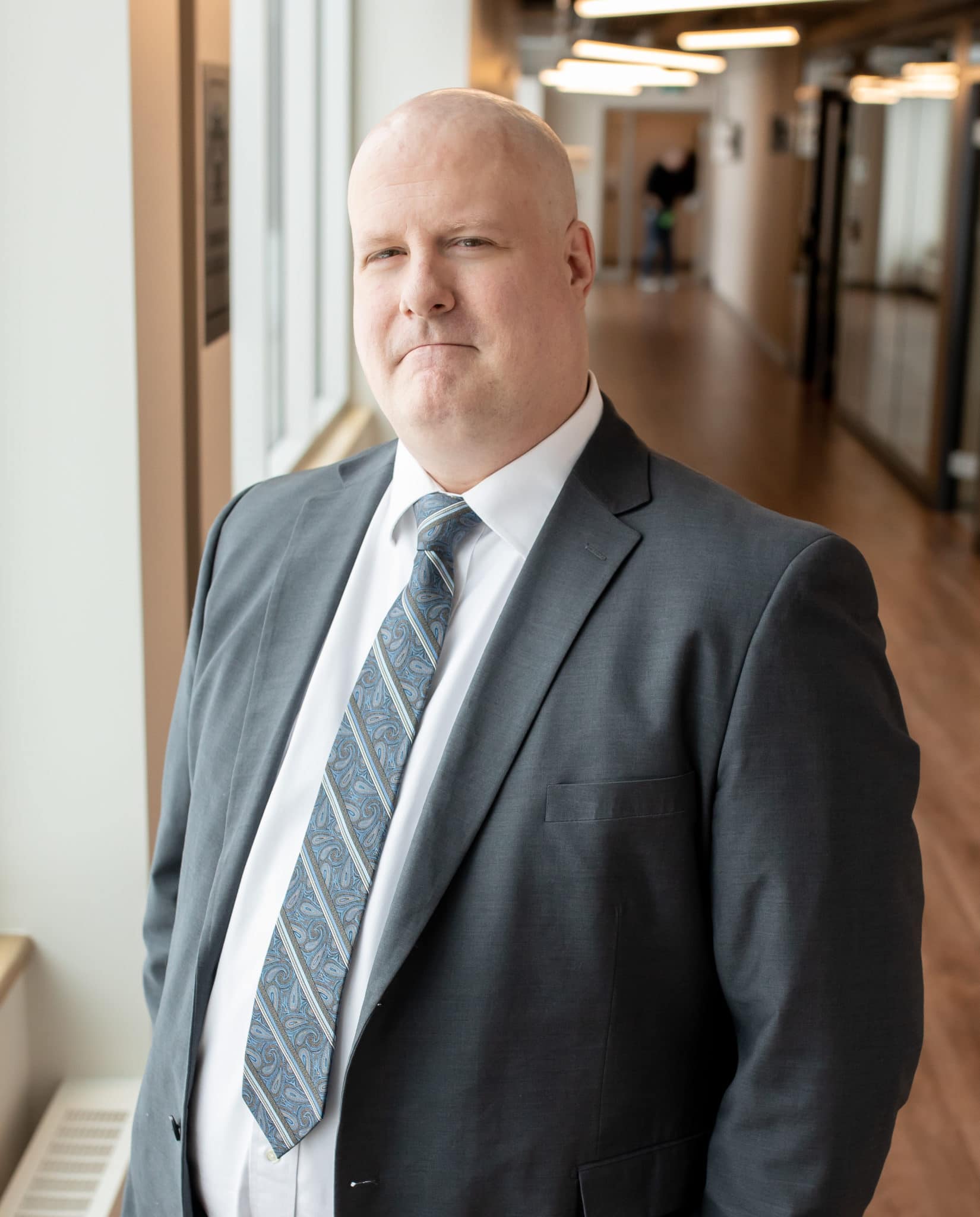Strategic Solutions to fill Security “Gaps”

Interview with Grant Lecky, a Global Security Visionary
Grant Lecky is the Co-Founder of the Security Partners’ Forum (SPF), the first of its kind “plug-and-play” agile network of the global security community, with the purpose of building security and resilience capacity globally. Initiated in 2011, the SPF facilitates and enables enhanced communication and collaborative opportunities amongst hundreds of security and resilience-related associations, networks and institutes across the globe including all levels of government, and across all sectors.
Grant currently works for the Department of Immigration, Refugees and Citizenship Canada and is responsible for numerous portfolios including strategic security management, crisis management, business continuity management and organizational resilience. He holds a Master’s Degree in Security and Risk Management from the University of Leicester, a Bachelor’s Degree in Criminology and Criminal Justice from Carleton University; a Diploma in Security Management from Algonquin College, as well as Advanced Certificates in Corporate Security Executive Leadership from the Burrill Green Business School (UK), Strategic Leadership from Georgetown University as well as in Strategic Crisis Management from the Kellogg School of Management (both programs in partnership with the International Security Management Association (ISMA)).
In addition to Grant’s work at IRCC and the SPF, Grant serves the security and resilience communities through other global initiatives including as a Member of the Advisory Council for the newly established Institute of Strategic Risk Management (ISRM), as a member of the Editorial Boards for the Canadian Who’s Who, the Cyber Security Journal and the Journal of Business Continuity & Emergency Planning (Henry Stewart Publications), as the Lead Judge & Head of the International Judging Panel for IFSEC Global’s “Top Influencers in Fire & Security”, and is also currently an Expert Network Member in Risk & Resilience with the World Economic Forum.
In this exclusive interview for Sovereign Magazine, I started by asking what drew him to the security and risk management field.

I began my career in security as a security guard in 1999 as a means to ‘help pay the bills’, but over time I discovered that I really enjoyed working in security, though I wasn’t keen on the low pay at the time. I realized that if I were to continue in the security disciplines, I would have to take steps to further professionalize in this field. I already had my degree from Carleton but felt I needed something more to advance within the security profession, and so I enrolled in the Security Management program at Algonquin College. Once I graduated I was able to begin working for the Government of Canada where I was able to further hone my skills in departmental corporate security and related disciplines. After a few years of working in government security, I discovered I had a talent for the more strategic aspects of departmental security and so I decided to further professionalize and so I began working towards a Master’s Degree in Security and Risk Management at the University of Leicester. Once I completed my Masters, additional opportunities arose to further professionalize and so I enrolled in advanced certificate programs in corporate security executive leadership, crisis management and strategic planning & leadership.
Throughout this period I obtained professional certifications / designations in business continuity, crisis management, strategic risk management and advanced security management such as the highly prestigious “Chartered Security Professional” (CSyP) which I received in July of 2018.
Since 2012 you have been accredited numerous awards, including the Bill Zalud Memorial Award, being named “Leader of The Decade in Risk & Resilience”, named to the “Canadian Who’s Who”, and named to the IFSEC Global ‘Top Influencers in Security & Fire’ by IFSEC Global. What would you say you owe your remarkable rise to?

“Leader of The Decade in Risk & Resilience”, named to the “Canadian Who’s Who”
It has been a great honour and validation of my efforts to have been recognized at home and internationally for my work in the security and resilience domains. The quickly changing landscape in which the security and resilience disciplines operate, require a climate that fosters continuous learning and ongoing professional development.
I have also had the good fortune of having highly skilled mentors in the security, resilience and leadership disciplines which have greatly contributed to my career development. In addition to mentoring, I can also attribute my success to working with, and learning from other esteemed professionals in my field. For example, my Partner and colleague Bonnie Butlin, and I was able to combine our expertise from different areas of security (hers in National Security, and mine in strategic corporate security and organizational resilience) to develop the Security Partners’ Forum which is now active across the globe.
In addition to Bonnie I have worked with others from various security disciplines to help develop new and exciting initiatives such as the Institute of Strategic Risk Management (ISRM). Having been mentored, I am now myself a mentor and therefore strongly believe in the notion of “sending the elevator back down” to help identify those who have not yet been recognized (but should be) and/or those that fall within the “next generation” that are making a difference in the security and resilience domains.
Participating in the Canadian Who’s Who Editorial Board and/or the IFSEC Top Influencers in Security & Fire allows me the opportunity to do just that.
Tell us in more detail what Security Partners’ Forum does and how it came about?
During my graduate studies, I realized the need for greater collaboration within the security industry, both within Canada and internationally. My research into the professionalization of the security industry revealed that the industry was siloed. Having identified what I interpreted to be a critical need, I set myself upon the task of developing a construct that could serve to break the silos and help to further professionalize the security industry. The end result was the creation of the Security Partners’ Forum (SPF).
The Security Partners’ Forum (SPF) began in Ottawa, Canada, in 2011. Operating on a not-for-profit model, the intent of the SPF was to break down silos and build capacity within security and among the professional security associations within the National Capital Region, using an agile networked model. The neutral and apolitical approach was highly effective in bringing together professionals from the private, public, and not-for-profit sectors toward enhancement of the security profession through information sharing and inter-connectivity. The effort was so successful and in such high demand, that the SPF quickly spread across Canada in 2012, and then internationally in 2014.
The SPF developed sub-networks for security executives (Canadian Security Executive Forum – CSEF), for women (WISECRA), and for cybersecurity professionals (the Canadian Cybersecurity Alliance – CCA). Growing a truly agile and networked community and platforms for the security community and for security professionals and associations, even within Canada, was an ambitious undertaking and was without similar precedent.
Fast-forward seven years later, and the SPF’s agile networked model is allowing new levels of strategic participation within security and is also filling security “gaps” in collaboration around the globe. For example, the SPF & CCA were recently able to assist the mining and metals sector in collaborating on information sharing – intuitive but disincentivized by the unique characteristics of the sector.
THE SPF & WISECRA have been facilitators for connecting women in security around the world. For example, as of 2019, numerous networks for women in security and resilience have been established in Africa, Spain, Ireland, Belgium, Turkey and the Balkan Region. These new networks were developed in consultation with existing women in security and resilience-related groups, and as such the women in security and resilience communities continue to build capacity on a global scale.
As another example, the SPF created the International Network of Security & Resilience Educators (INSRE), which is set to transform security and resilience education and the effectiveness of interaction among security practitioners and academia around the world. Since its modest beginnings, the SPF now works with more than 750 not-for-profit professional security associations, institutes and related entities globally, and is doing so with increasing momentum and effect. The SPF as an organization has focused on identifying opportunities and talent and is in an enviable position to acknowledge and celebrate the efforts and successes of our security community and colleagues.
We have also been privileged to celebrate our own successes, which are breaking expectations and ceilings, and inspiring others along the way. As a result, we are all contributing to enhancing and maturing the security profession.
What are the challenges the security sector faces in 2019 and beyond?
The current challenges to the security industry are numerous and vary according to which sector you are looking at. One consistent theme that keeps emerging relates to difficulties in both the finding and retention of top talent and this seems to apply to all sectors of security.
Another challenge to security as a whole for 2019 and beyond is that legislation related to security will not be able to keep up with current realities. Law makers do not tend to have a strong background in security, especially the more technological disciplines. Many of our laws are years, perhaps even a decade or more behind the current technological climate. The nature of law making is such that even if changes to suit the modern environment were enacted, they are often done so with very little forewarning to stakeholders ahead of time and as a result, they have little time to adjust their business practices to achieve compliance with the new laws and regulations.
General Data Protection Regulation (GDPR) will continue to pose challenges to security across the globe. In addition to the European Union, other countries and individual states within the U.S. are in the process of passing variations of GDPR legislation. As a result, organizations across all sectors will continue to face challenges related to security, data protection and privacy systems and policies in terms of employee awareness and compliance, among other.
Other challenges to keep an eye on in 2019 and beyond will include (but will not be limited to): Increasingly sophisticated cybercrime, ransomware, phishing attacks, social engineering schemes and insider threats; artificial intelligence, Internet of Things (IoT), increasing automation, and societal risk tolerances & expectations of the security community.
What can you tell us about your plans for 2019 and 2020?
2019 has been a very busy year and all indications thus far are that it will continue to be a busy year. At the beginning of 2019 I worked alongside Dr. David Rubens, Lord Toby Harris and other esteemed security and crisis management professionals from across the globe to help establish the Institute of Strategic Risk Management (ISRM). The ISRM has been established in order to create a global centre where practitioners, academics and policy makers can come together to share information, help progress and promote the underlying understanding and capabilities associated with strategic risk and crisis management, and develop their own personal and professional networks.

ASIS NZ Women in Security Seminar” in Wellington, New Zealand
I will also be speaking in New Zealand at the “ASIS NZ Women in Security Seminar” in Wellington on May 3. As I mentioned earlier I am also Head of the International Judging Panel for IFSEC Global’s “Top Influencers in Fire & Security” and I am currently working with the current Judging panel to help determine the Top Influencers for Security & Fire for 2019 and that list will be published in early June.
I look forward to working with Bonnie Butlin to help establish additional women in security networks across the globe as we will continue to work on these and related initiatives in 2019 (and 2020).





